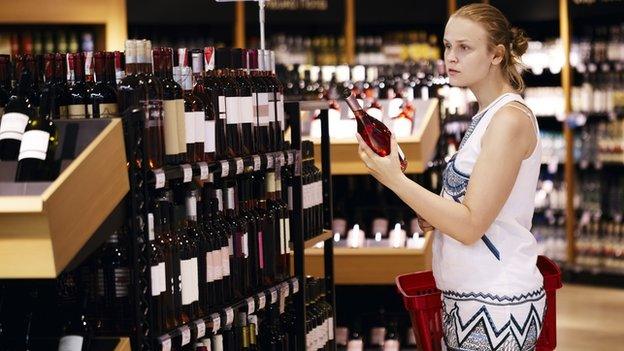Scottish attitudes to alcohol pricing split
- Published

Charging for drink by the amount of alcohol was supported by 41% of the survey respondents
A new study of Scotland's attitudes to alcohol has suggested people are slightly more in favour of introducing minimum unit pricing than against.
The Scottish Social Attitudes Survey 2013 questioned about 1,500 people.
The survey said that 41% of people were in favour of the Scottish government policy to charge a minimum unit price for alcohol.
The research found 35% were against the policy and 22% had no strong view either way.
Of those who were against the policy, 17% of people said they were "strongly against".
The Scottish government wants to set a 50p rate per unit of alcohol
There was even less certainty among those in favour of the policy, with just 15% "strongly in favour".
The research was part of an annual survey of social and political attitudes run by ScotCen Social Research since 1999.
The questions on alcohol were funded by the Scottish government and managed by NHS Health Scotland.
They want to track changes in attitudes to drinking alcohol from 2004 and 2007 when the questions were last included in the survey.
Scottish government ministers claim minimum unit pricing for alcohol is vital to address Scotland's "unhealthy relationship with drink".
They want to curb excessive consumption by raising the price of high-strength booze.
However, the flagship legislation, which was passed in 2012, could be delayed for another two years after the Scotch Whisky Association's legal challenge was referred to the Court of Justice of the European Union.
Cheap prices
The Scottish government wants to set a 50p rate per unit of alcohol, which would mean the minimum price a shop or supermarket would be allowed to charge for four large cans of beer would be Ā£4.40, a bottle of wine would be Ā£5 and a standard bottle of vodka Ā£13.
Between 55% and 66% of adults thought the suggested minimum prices for beer, wine and vodka were "about right".
The survey asked people about their attitudes to drinking alcohol
Just under half (46%) of the people surveyed thought supermarkets sold too much alcohol at very cheap prices.
The Social Attitudes Survey also asked people how much price was an issue when buying alcohol.
About 65% of adults said price did not prevent them from buying as much as they liked.
Health problems
Attitudes to minimum pricing varied across different groups with women more likely to support it than men.
People educated to degree level were much more likely to approve of minimum pricing than those who were not.
Support for the policy was lowest among higher risk drinkers and highest among non-drinkers.
People who expressed the view that alcohol causes Scotland "a great deal" of harm were also likely to strongly support unit pricing.
The three most commonly mentioned reasons for supporting minimum pricing were preventing health problems, stopping young people drinking and tackling problem behaviour.
People not in favour of minimum pricing said it would not make a difference to heavy drinkers who would drink "whatever the price".
They also thought the policy was unfair as it "punishes everyone for what some drinkers do" and it "punishes those who are less well off".
- Published30 April 2014